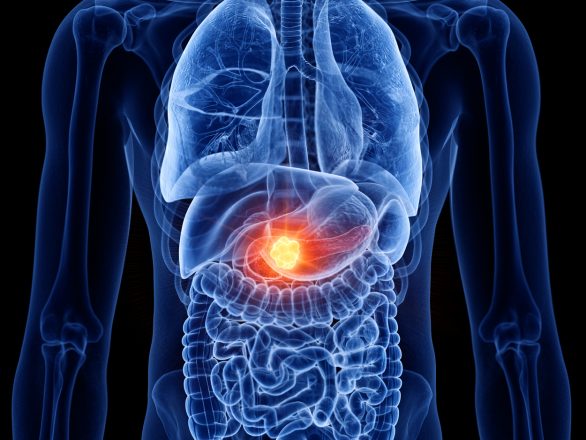
Targeted drug found effective in thwarting pancreatic tumors
Pancreatic cancer is an aggressive disease in which malignant cells form
in the tissues of the pancreas, a long and flat gland located behind the stomach
that helps with digestion and blood sugar regulation. Because pancreatic cancer
is difficult to detect early, it is associated with a low survival rate,
accounting for just over 3% of all new cancer cases in the U.S., but leading to
nearly 8% of all cancer deaths, according to the National Cancer Institute.
Through a pre-clinical study conducted in his former role at Moffitt
Cancer Center and published in Clinical Cancer Research, Said Sebti,
Ph.D., associate director for basic research at VCU Massey Cancer Center,
identified a novel drug that effectively thwarts pancreatic tumors that are
addicted to the cancer-causing mutant KRAS gene. Sebti recently met with
clinical colleagues at Massey to discuss evaluating the drug in clinical trials
in patients whose pancreatic tumors harbor mutant KRAS.
“We discovered a link between hyperactivation of the CDK protein
and mutant KRAS addiction, and we exploited this link preclinically to counter
mutant KRAS-driven pancreatic cancer, warranting clinical investigation in
patients afflicted with this deadly disease,” said Sebti, who is also the
Lacy Family Chair in Cancer Research at Massey and a professor of pharmacology
and toxicology at the VCU School of Medicine. “Our findings are highly
significant as they revealed a new avenue to combat an aggressive form of
pancreatic cancer with very poor prognosis due mainly to its resistance to
conventional therapies.”
KRAS is mutated in 90 percent of pancreatic cancers. Previous research
from the Sebti lab and other labs has demonstrated that some tumors that harbor
mutant KRAS are actually addicted to the mutant gene, meaning they cannot
survive or grow without it. Sebti set out to discover if there is a drug that
can specifically kill tumors that are addicted to mutant KRAS.
Sebti and collaborators used three scientific approaches to try and
answer this question.
First, they mapped out the blueprint of pancreatic cancer cells through
global phosphoproteomics, which gave them a snapshot of how the addicted and
non-addicted tumors differ at the phosphoprotein level. They found two proteins
— CDK1 and CDK2 — which were indicative of which cells were addicted to
mutant KRAS.
Additionally, they analyzed a comprehensive database from the Broad
Institute of MIT and Harvard that contains genome-wide CRISPR gRNA screening
datasets. They found that CDK1 and CDK2 as well as CDK7 and CDK9 proteins were
associated with mutant KRAS-addicted tumors.
Lastly, they evaluated the ability of a library of 294 FDA drugs to
selectively kill mutant KRAS-addicted cancer cells over non-KRAS-addicted
cancer cells in the lab and determined the most effective drug in preclinical
experiments was AT7519, an inhibitor of CDK1, CDK2, CDK7 and CDK9.
“Using three entirely different approaches, the same conclusion
presented itself clearly to us: pancreatic cancer patients whose tumors are
addicted to mutant KRAS could benefit greatly from treatment with the CDK
inhibitor AT7519,” Sebti said.
To further validate these findings in fresh patient-derived tumors from
pancreatic cancer patients, Sebti collaborated on this study with Jose Trevino,
M.D., surgeon-in-chief and the Walter Lawrence, Jr., Distinguished
Professorship in Oncology at Massey who was at the University of Florida at the
time. They found that AT7519 suppressed the growth of xenograft cells from five
mutant KRAS pancreatic cancer patients who relapsed on chemotherapy and/or
radiation therapies.
AT7519 has previously been tested unsuccessfully in a number of clinical
trials, but none of the trials targeted pancreatic cancer.
“If our findings are correct and translate in humans, then we
should be able to see a positive response in pancreatic cancer patients whose
tumors are addicted to mutant KRAS,” Sebti said.
The study authors believe that, in addition to pancreatic cancer, these
findings may also have clinical implications for colorectal and non-small cell
lung cancer patients where mutations in KRAS are prevalent.
Journal Reference:
- Aslamuzzaman Kazi,
Liwei Chen, Shengyan Xiang, Rajanikanth Vangipurapu, Hua Yang, Francisca Beato,
Bin Fang, Terence M. Williams, Kazim Husain, Patrick Underwood, Jason B.
Fleming, Mokenge Malafa, Eric A. Welsh, John Koomen, José Trevino, Saïd M.
Sebti. Global Phosphoproteomics Reveal CDK Suppression as a
Vulnerability to KRas Addiction in Pancreatic Cancer. Clinical
Cancer Research, 2021; DOI: 10.1158/1078-0432.CCR-20-4781